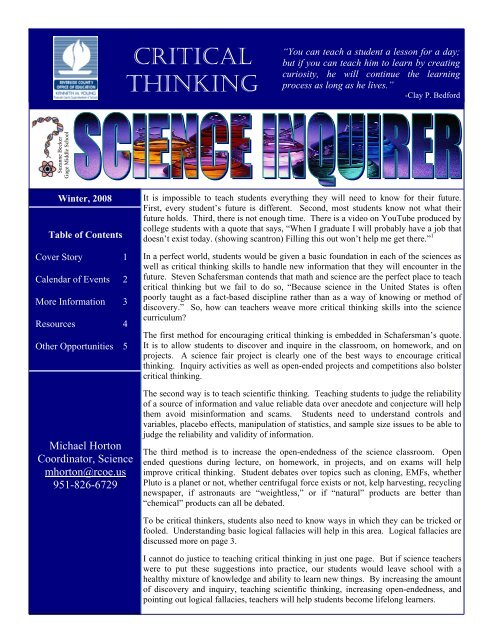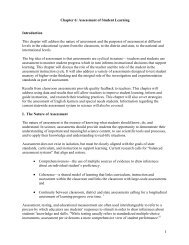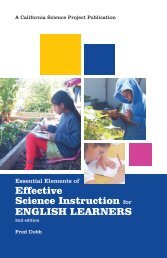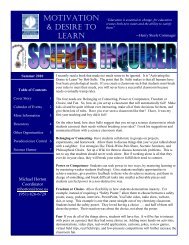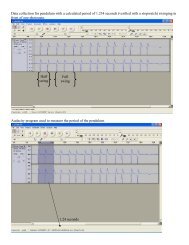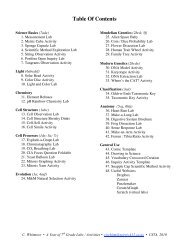CRITICAL THINKING - scienceinquirer - Wikispaces
CRITICAL THINKING - scienceinquirer - Wikispaces
CRITICAL THINKING - scienceinquirer - Wikispaces
Create successful ePaper yourself
Turn your PDF publications into a flip-book with our unique Google optimized e-Paper software.
<strong>CRITICAL</strong><br />
<strong>THINKING</strong><br />
“You can teach a student a lesson for a day;<br />
but if you can teach him to learn by creating<br />
curiosity, he will continue the learning<br />
process as long as he lives.”<br />
-Clay P. Bedford<br />
Suzanne Becker<br />
Gage Middle School<br />
Winter, 2008<br />
Table of Contents<br />
Cover Story 1<br />
Calendar of Events 2<br />
More Information 3<br />
Resources 4<br />
Other Opportunities 5<br />
Michael Horton<br />
Coordinator, Science<br />
mhorton@rcoe.us<br />
951-826-6729<br />
It is impossible to teach students everything they will need to know for their future.<br />
First, every student’s future is different. Second, most students know not what their<br />
future holds. Third, there is not enough time. There is a video on YouTube produced by<br />
college students with a quote that says, “When I graduate I will probably have a job that<br />
doesn’t exist today. (showing scantron) Filling this out won’t help me get there.” 1<br />
In a perfect world, students would be given a basic foundation in each of the sciences as<br />
well as critical thinking skills to handle new information that they will encounter in the<br />
future. Steven Schafersman contends that math and science are the perfect place to teach<br />
critical thinking but we fail to do so, “Because science in the United States is often<br />
poorly taught as a fact-based discipline rather than as a way of knowing or method of<br />
discovery.” So, how can teachers weave more critical thinking skills into the science<br />
curriculum?<br />
The first method for encouraging critical thinking is embedded in Schafersman’s quote.<br />
It is to allow students to discover and inquire in the classroom, on homework, and on<br />
projects. A science fair project is clearly one of the best ways to encourage critical<br />
thinking. Inquiry activities as well as open-ended projects and competitions also bolster<br />
critical thinking.<br />
The second way is to teach scientific thinking. Teaching students to judge the reliability<br />
of a source of information and value reliable data over anecdote and conjecture will help<br />
them avoid misinformation and scams. Students need to understand controls and<br />
variables, placebo effects, manipulation of statistics, and sample size issues to be able to<br />
judge the reliability and validity of information.<br />
The third method is to increase the open-endedness of the science classroom. Open<br />
ended questions during lecture, on homework, in projects, and on exams will help<br />
improve critical thinking. Student debates over topics such as cloning, EMFs, whether<br />
Pluto is a planet or not, whether centrifugal force exists or not, kelp harvesting, recycling<br />
newspaper, if astronauts are “weightless,” or if “natural” products are better than<br />
“chemical” products can all be debated.<br />
To be critical thinkers, students also need to know ways in which they can be tricked or<br />
fooled. Understanding basic logical fallacies will help in this area. Logical fallacies are<br />
discussed more on page 3.<br />
I cannot do justice to teaching critical thinking in just one page. But if science teachers<br />
were to put these suggestions into practice, our students would leave school with a<br />
healthy mixture of knowledge and ability to learn new things. By increasing the amount<br />
of discovery and inquiry, teaching scientific thinking, increasing open-endedness, and<br />
pointing out logical fallacies, teachers will help students become lifelong learners.
Page 2<br />
PLC in Science Day 3 will teach about the philosophy, the process, and the content of a Professional Learning Community; how to<br />
establish a PLC at the site; and how PLCs can be used specifically by science teachers to improve student achievement.<br />
Date: January 24, 2008 at Patriot High School<br />
District Science Leadership Network Meeting will support conversations amongst science leaders about data, research in science<br />
education, legislative updates, changes in testing and accountability, best practices, and what is working in other districts. DSLN<br />
meets approximately quarterly following the CISC Science Subcommittee meetings.<br />
Date: January 17, 2008<br />
Review the 4 th and 5 th Grade Science Standards will provide hands-on activities to review 4 th grade standards and do a last<br />
minute push on 5 th grade standards before April. Science materials, a resource CD, and reproducible activities will be provided.<br />
February 5 th and 12 th : See registration flyer at the end of the newsletter.<br />
IASTA Meetings: Become a member of the Inland Area Science Teachers Association and have dinner with colleagues<br />
approximately monthly to discuss interesting topics. Many dinner meetings are at interesting science-related locations. Email<br />
info@iasta.org to join.<br />
Dates: January 31, West Randall Elem.; February 28, SB County Office; March 20, SB County Museum; April 24, CSUSB;<br />
May 15, Western Center for Archaeology; June 5, Living Desert<br />
Guest Lecture Series: Free guest lectures on a variety of topics are offered monthly at the San Bernardino County Museum.<br />
Lectures are generally the 4 th Wednesday of the month at 7:30 pm. Every 1 st Sunday of the month offers free admission to the<br />
museum as well.<br />
January 23- Elizabeth Cochran, Faults in the Mojave February 27- Mark Allen, Archaeological research in the Western Mojave<br />
March 26- Daphne Fairbairn, Sexual dimorphism in the animal kingdom<br />
JPL Lecture Series: Each month, the Jet Propulsion Laboratory has a guest lecturer. The lecture is repeated the following day at<br />
Pasadena City College. Topics last year included, “Predicting Climate Change” and “Looking for Earth in Other Places.” 2008<br />
events are not yet available.<br />
Visit http://www.jpl.nasa.gov/events/lectures.cfm for information when it becomes available.<br />
Riverside Astronomical Society: RAS has several events each month from lectures to star parties and to telescope building and<br />
optical astronomy. Locations for these meetings vary and dates depend on the phase of the moon. They also perform assemblies<br />
and star parties for schools and after school activities.<br />
Visit http://www.rivastro.org/ for more information<br />
Riverside Metropolitan Museum: RMM has programs for students, teachers, and adults in science, art, and nature.<br />
Visit http://www.riversideca.gov/museum/ for more information<br />
Western Center for Archaeology and Paleontology: The Western Center is a museum featuring fossils unearthed in Hemet during<br />
the construction of the Diamond Valley Reservoir. The museum is open to the public and has several events for students, college<br />
students, and the public each month including Discovery Labs and after-school programs.<br />
Visit http://www.westerncentermuseum.org/ for more information<br />
If you would like to have an event included in a future newsletter, email it 4 weeks prior to the release of<br />
that issue [Summer (June), Fall (October), Winter (January), Spring (April)] to mhorton@rcoe.us.<br />
This calendar of events is not a complete list. Many events are not RCOE events and RCOE cannot verify their content.
More Information<br />
Logical Fallacies<br />
Page 3<br />
A logical fallacy is an invalid argument. Logical fallacies can be broken down into categories. There are numerous categories of<br />
logical fallacies and I will describe some of the more common ones here.<br />
Argument From Authority- This logical fallacy is where the only evidence that the person making the argument presents is that<br />
someone famous or powerful also supports their idea. This is a common technique used in TV commercials. Fitness products often<br />
use fake doctors to present their unsubstantiated claim hoping that this “authority” will convince people that their product works.<br />
There comes a point when there are enough authorities that this fallacy does not apply anymore. For example, there are so many<br />
qualified scientists supporting global warming that quoting “the vast majority of scientists” is not an argument from authority.<br />
Confusing Correlation With Causation- This logical fallacy is one in which the proponent does not see the difference between<br />
correlation and causation. Two things can be correlated without one causing the other. One hilarious website demonstrates this<br />
fallacy perfectly with a graph showing that since the number of pirates began to dwindle since the 1800s, average global<br />
temperature has increased. Therefore, dwindling pirate numbers must be causing global warming.<br />
Post hoc ergo propter hoc- This fallacy assumes that because one thing happened after another that the first must have caused the<br />
second. An example is the argument that vaccines cause autism. Proponents argue that because their child “became autistic” after<br />
receiving vaccines, that the vaccines must have caused the autism. Scientific studies have shown that clear signs of autism<br />
coincidentally show up at about the same age that vaccines are given (see correlation/causation fallacy) and that more subtle signs<br />
existed before the vaccines. Studies have also demonstrated that since thimerosal use in vaccines has been discontinued, the<br />
number of autism cases has remained steady. Unfortunately, the definition of autism changed at the same time so there are studies<br />
that contradict this argument and say that the numbers have increased. Using the old definition, they have not.<br />
Ad-hominem- This fallacy, sometimes called an ad-hominem attack, is one that says that an argument cannot be true because the<br />
proponent has personality flaws or has been wrong before. Some venerations of this fallacy are, “You can’t believe UFO<br />
proponents because they’re all crazy” or “You can’t believe skeptics because they are closed-minded.”<br />
“Poisoning the Well”- This fallacy is used to argue against one thing by connecting it so something else that is seen as negative.<br />
An example is a satirical website makes the point that “Dihydrogen monoxide” (water) is used in nuclear power plants, and<br />
terrorist communes, is found in tumors, and is consumed by 100% of serial killers, therefore, it should be banned.<br />
Argument From Personal Incredulity- This fallacy boils down to “I cannot believe that this could be true, therefore it cannot be<br />
true.” I am often guilty of this fallacy when dealing with topics related to quantum physics. I cannot believe that the universe<br />
could be made of tiny strings or that most of the universe is made of invisible dark matter, therefore these theories cannot be true<br />
to me. Evolution deniers are guilty of this when they say “I cannot believe that complex creatures could evolve from simple<br />
creatures, therefore evolution is untrue.”<br />
“Straw Man”- A straw man argument is when a proponent claims that their opponent said something or believes something that<br />
they don’t really believe and then smash that simple argument, the “straw man.” Sometimes, the proponent simplifies their<br />
opponent’s view so much that it becomes a straw man. UFO proponents may say that scientists don’t believe in aliens because<br />
they have not seen them with their own eyes. All scientists believe in things they cannot see with their own eyes. I believe in red<br />
blood cells, electrons, black holes, and armadillos but I have not seen any of them.<br />
“False Premise”- This is when the premise upon which the proponent’s argument is based is not correct. Some argue that we<br />
should not irradiate food because it makes the food radioactive which is not healthy for us. Irradiating food does not make the<br />
food radioactive so the premise is false and any arguments based upon that premise are useless.<br />
Analyzing arguments for logical fallacies is a very powerful practice to improve scientific thinking and improve the ability to<br />
debate logically. Satirical websites are great practice in this. Even better is analyzing our own arguments for logical fallacies.
Resources<br />
Page 4<br />
1 YouTube video, A Vision of Students Today, referenced in cover article:<br />
http://www.youtube.com/watch?v=dGCJ46vyR9o&eurl=http://mediatedcultures.net/ksudigg/?cat=9<br />
High-quality version at http://www.mediafire.com/?3xbhmdmsfmd (100 Mb)<br />
General information about logical fallacies and arguments:<br />
http://en.wikipedia.org/wiki/Logical_fallacy<br />
http://en.wikipedia.org/wiki/List_of_fallacies<br />
http://www.logicalfallacies.info/<br />
http://leo.stcloudstate.edu/acadwrite/logic.html<br />
http://www.theskepticsguide.org/logicalfallacies.asp<br />
http://www.onegoodmove.org/fallacy/toc.htm<br />
Satirical science websites with lots of (tongue-in-cheek) logical fallacies:<br />
Save The Pacific Northwest Tree Octopus: http://zapatopi.net/treeoctopus/<br />
Ban Dihydrogen Monoxide: http://www.dhmo.org/<br />
The Hazards of Solar Energy: http://www.lhup.edu/~dsimanek/solar.htm<br />
Fake biographies of historical explorers: http://www.allaboutexplorers.com/explorers/<br />
Discovery of a dinosaur saddle: http://www.avantnews.com/modules/news/article.php?storyid=126<br />
Ideal Scientific Equipment Company: http://www.lhup.edu/~dsimanek/ideal/ideal.htm<br />
Aliens Announce Completion of Human Research Program:<br />
http://www.avantnews.com/modules/news/article.php?storyid=326<br />
Most Studies Find Nothing, Study Finds:<br />
http://www.avantnews.com/modules/news/article.php?storyid=253<br />
Teaching critical thinking and research on how people learn:<br />
“What We Know About How People Learn”, California Journal of Science Education<br />
http://cascience.org/csta/pub_learnjournal.asp<br />
“Teaching Critical Thinking: Some Lessons from Cognitive Science”<br />
http://www.philosophy.unimelb.edu.au/reason/papers/Teaching_CT_Lessons.pdf<br />
“An Introduction to Critical Thinking”<br />
http://www.freeinquiry.com/critical-thinking.html
Page 5<br />
High-Speed Videos<br />
I have the ability to record video at 250 frames per second and play it back at 1 frame per second. This<br />
effectively slows video down 250 times. I would like to make videos for teachers to use in classrooms. If<br />
you have suggestions for videos, email them to me at mhorton@rcoe.us. If you have items to send to be<br />
used in the video, just send them to RCOE through the district mail to Instructional Support Services,<br />
Attn: Mike Horton<br />
I have some sample videos on the website at http://<strong>scienceinquirer</strong>.wikispaces.com/movies. I can put<br />
rulers and/or grids in the background for quantitative analyses of the videos. At 250 frames per second,<br />
the camera can capture water balloons bouncing, low frequency vibrations, toys, rocket launches, etc.<br />
Thanks to Dave Susuras at Vista Del Lago High School, I will soon have new videos including an<br />
exploding hydrogen balloon, a Whoosh Bottle, and an inertia demonstration involving a balloon popping.<br />
Toy Ball Bouncing<br />
Gauss Rifle Firing<br />
Website Update<br />
The Science Inquirer website continues to grow and improve. Each section has a discussion area where you can<br />
comment and make suggestions. If you haven’t visited in a while, here is what you can find:<br />
- Archives of Past Science Inquirer Newsletters http://<strong>scienceinquirer</strong>.wikispaces.com<br />
- Science Misconception Podcast (30+ available) http://<strong>scienceinquirer</strong>.wikispaces.com/misconception<br />
- Free Stuff for Science Teachers (Over 200 resources!)<br />
http://<strong>scienceinquirer</strong>.wikispaces.com/misconception<br />
- Super Slow Motion Videos (5 Available, more to come) http://<strong>scienceinquirer</strong>.wikispaces.com/videos<br />
- Digital Microscope Pictures (12 Available, more to come) http://<strong>scienceinquirer</strong>.wikispaces.com/Microscope<br />
- CSTA Presentation PowerPoints and White Papers http://<strong>scienceinquirer</strong>.wikispaces.com/csta
Inland Science and Engineering Fair<br />
Judge/Volunteer Information Sheet<br />
April 15, 2008<br />
(Please Print)<br />
Riverside<br />
Inyo Mono San Bernardino<br />
Name<br />
Mailing Address<br />
City, Zip Code<br />
Home Phone<br />
Cell Phone<br />
Work Phone<br />
I will join you for lunch<br />
District/Site I have been a judge times.<br />
E-mail Address<br />
I will judge and/or volunteer to help as needed during the following events on Tuesday, April 15, 2008:<br />
(We encourage you to judge more than one division if possible.)<br />
8:30 a.m. – 12:00 noon, Judge Junior Division (Grades 6-8) Set-Up<br />
12:30 p.m. – 3:30 p.m., Judge Senior Division (Grades 9-12) Clean-Up<br />
8:30 a.m. – 12:00 noon, Judge Elementary Division (Grades 4 and 5)<br />
and/or<br />
1:00 p.m. – 3:30 p.m., Judge Elementary Division (Grades 4 and 5)<br />
I am most qualified to judge in the following categories: (Check as many boxes as appropriate)<br />
Elementary: (Elementary judging time: 8:30 a.m. – 12 noon or 1:00 – 3:30 p.m.)<br />
1. Behavior Sciences 2. Biology Animals 3. Biology/Other<br />
Kingdoms<br />
5. Consumer Science 6. Earth Sciences 7. Environmental<br />
Education<br />
9. Physics<br />
4. Chemistry<br />
8. Math<br />
Junior/Senior: (Junior division judging time: 8:30 a.m. – 12 noon; Senior division judging time: 12:30 p.m. – 3:30 p.m.)<br />
1. Aerodynamics/<br />
Hydrodynamics<br />
2. Applied Mechanics/<br />
Structures and<br />
Mechanics/Manufacturing<br />
5. Chemistry 6. Earth Sciences/<br />
Planetary Sciences/<br />
Physical Environments<br />
9. Environmental Science<br />
(Jr. Division only)<br />
3. Behavioral<br />
Sciences<br />
7. Electricity<br />
and<br />
Electronics<br />
10. Mammalian Biology 11. Materials<br />
Science<br />
(Jr. Division only)<br />
4. Biochemistry/<br />
Molecular Biology<br />
8. Environmental<br />
Engineering<br />
12. Mathematics &<br />
Software<br />
13. Microbiology 14. Pharmacology/<br />
Toxicology<br />
15. Physics and<br />
Astronomy<br />
16. Plant Biology<br />
17. Social Sciences<br />
(Jr. Division only)<br />
Other/Comments:<br />
Please mail or fax this form to:<br />
18. Structural Capability and<br />
Strength of Materials<br />
(Jr. Division only)<br />
19. Zoology<br />
Tracey Rivas, Programs and Student Activities Facilitator<br />
Riverside County Office of Education<br />
P.O. Box 868<br />
Riverside, CA 92502-0868 (951) 826-6570; FAX (951) 826-6954
Last Minute Review of 4 th and 5 th Grade Science Standards<br />
With Hands-on Activities to Improve Student Performance<br />
This hands-on workshop will cover key science standards in 4 th and 5 th grade that will have the biggest payoff on state tests.<br />
Participants will receive resources such as reproducible activities, materials (rocks, minerals, magnets, bulbs etc.), a CD full of<br />
resources, and background information to review these standards with students. If your students need to review 4 th grade<br />
standards or get one more exposure to 5 th grade standards, then this is the workshop for you.<br />
During both days, researched-based hands-on experiments with simple materials will be used to enhance teaching the standards<br />
clearly, which are focused and directly address the key standards. Participants will also receive materials that cannot be<br />
purchased in your local community to perform these activities in the classroom. Inquiry, safety, and integrating science with<br />
core subjects will be discussed.<br />
Who Should Attend?<br />
Event Information<br />
\<br />
4 th and 5 th grade teachers, Science<br />
Specialists/ Staff Developers, Directors of<br />
Curriculum, Assistant Superintendents,<br />
and Assessment Coordinators<br />
Presenter(s)<br />
Rick Hall, Coordinator<br />
San Bernardino County Superintendent of Schools<br />
Michael Horton, Coordinator<br />
Riverside County Office of Education<br />
Jodye Selco, CEEMAST Professor<br />
Cal Poly Pomona<br />
Questions?<br />
Rasamee Jaycox, 909-386-2611<br />
rasamee_jaycox@sbcss.k12.ca.us<br />
Date: February 5, 2008 (Day 1)<br />
February 12, 2008 (Day 2)<br />
Time:<br />
8:30 am – 3 pm registration begins at 8:00 am<br />
Location: Norman F. Feldheym Central Library<br />
555 West 6 th Street<br />
San Bernardino<br />
* Extra parking available at the SBCSS office at 601<br />
North E Street, San Bernardino<br />
This facility is handicapped accessible.<br />
Cost:<br />
$250.00 (includes CD, printed materials, and supplies<br />
for classroom)<br />
Snacks and lunch are included both days (Please<br />
specify dietary restrictions when registering online)<br />
Limit: 100<br />
Register Online: http://sbcss.k12.ca.us/events<br />
----------------------------------------------------------------------------<br />
Last Minute Review of 4 th & 5 th Grade Standards, February 5 th and 12 th 2008<br />
Name:<br />
Title:<br />
District:<br />
School:<br />
Phone: ( ) Fax: [ ]<br />
Email:<br />
Payment: P.O. # Check #:<br />
Make check or purchase order payable to: San Bernardino County Superintendent of<br />
Schools<br />
*Please note “Rick Hall” in the body of purchase order<br />
Registration Deadline: January 23, 2008- No refunds after the deadline date.<br />
Return to:<br />
SBCSS, Curriculum & Instruction<br />
Attn: Rick Hall<br />
601 North E Street<br />
San Bernardino CA 92410-3093<br />
Fax: [909] 386-2667<br />
Meal preference: (check one)<br />
ο Vegetarian<br />
ο Regular<br />
If registering online, please specify<br />
dietary restrictions.<br />
Map of location and confirmation will be sent when registration and proof of payment are received. If you do not receive<br />
written confirmation by January 23, 2008, please contact Rasamee Jaycox at 909-386-2611 or<br />
rasamee_jaycox@sbcss.k12.ca.us
Let’s Get WET!<br />
FREE California Project WET Workshop<br />
FREE K-12 Teacher Workshop sponsored by Western Municipal Water District and<br />
California Regional Environmental Education Community (CREEC)/Region 10. Hands-on<br />
teacher-friendly water education classroom materials that meet state curriculum standards.<br />
Continuing Education Units. Limited enrollment. Pre-registration required, see form below or<br />
register online at http://www.wmwd.com/ProjectWET. Feel free to share this information with<br />
other colleagues that may be interested.<br />
Who Should Attend?<br />
All educators, public and private.<br />
Presenter(s)<br />
Monique Navarrette/<br />
Western Municipal Water District<br />
Kathy Havert/CREEC/Region 10<br />
Questions?<br />
Monique Navarrette (951) 789-5038<br />
Mnavarrette@wmwd.com<br />
Kathy Havert at (909) 386-2797<br />
Kathy_Havert@sbcss.k12.ca.us<br />
Event Information<br />
Date: Saturday, March 22, 2008<br />
Time: 9 a.m. to 3 p.m.<br />
Location: Western Municipal Water<br />
District/ Landscapes Southern<br />
California Style SM<br />
450 E. Alessandro Boulevard<br />
Riverside, 92508<br />
Cost: FREE<br />
Deadline: Tuesday, March 11, 2008<br />
Formal educators eligible for Continuing Education Units!<br />
Register Online:<br />
http://www.wmwd.com/ProjectWET<br />
..............................................................................................<br />
Let’s Get WET!<br />
Name:<br />
Title:<br />
District:<br />
School:<br />
Phone: ( ) Fax: [ ]<br />
Email:<br />
Registration Deadline: Tuesday, March 11, 2008<br />
Return to: Western Municipal Water District<br />
Attn: Monique Navarrette/Education Programs<br />
450 E. Alessandro Blvd.<br />
Riverside, CA. 92508<br />
Fax: [951] 780-3837<br />
Map of location and confirmation will be sent when registration is received. If you do not receive written confirmation by<br />
March 17, 2008, please contact Monique Navarrette at (951) 789-5038 or Mnavarrette@wmwd.com.


